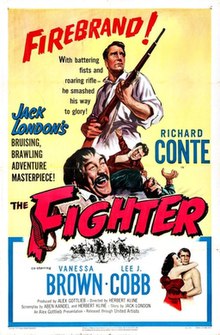
Boxing is a combat sport and a martial art in which two people, usually wearing protective gloves and other protective equipment such as hand wraps and mouthguards, throw punches at each other for a predetermined amount of time in a boxing ring.
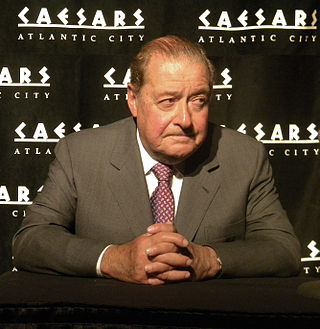
Robert Arum is an American lawyer and boxing promoter. He is the founder and CEO of Top Rank, a professional boxing promotion company based in Las Vegas. Prior to becoming a boxing promoter, Arum was employed as an attorney in the tax division of the United States District Court for the Southern District of New York.
The year 1992 in film involved many significant film releases.
The following is an overview of events in 1985 in film, including the highest-grossing films, award ceremonies and festivals, a list of films released and notable births and deaths.
The year 1974 in film involved some significant events.
The year 1973 in film involved some significant events.
The year 1957 in film involved some significant events. The Bridge on the River Kwai topped the year's box office in North America, France, and Germany, and won seven Academy Awards, including Best Picture.
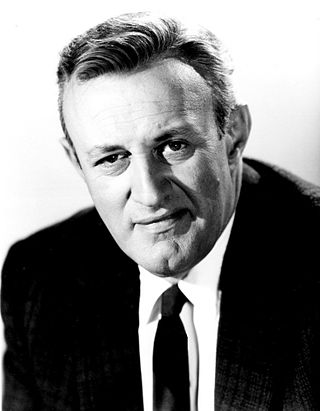
Lee J. Cobb was an American actor, known both for film roles and his work on the Broadway stage, as well as for his television role in the series, The Virginian. He often played arrogant, intimidating and abrasive characters, but he also acted as respectable figures such as judges and police officers. Cobb originated the role of Willy Loman in Arthur Miller's 1949 play Death of a Salesman under the direction of Elia Kazan, and was twice nominated for the Academy Award for Best Supporting Actor, for On the Waterfront (1954) and The Brothers Karamazov (1958).
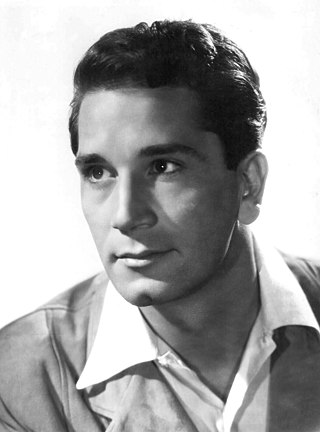
Nicholas Peter Conte, known professionally as Richard Conte, was an American actor. He appeared in more than 100 films from 1939 through the 1970s, including I'll Cry Tomorrow, Ocean's 11, and The Godfather.

The Big Combo is a 1955 American film noir crime film directed by Joseph H. Lewis, written by Philip Yordan and photographed by cinematographer John Alton, with music by David Raksin. The film stars Cornel Wilde, Richard Conte and Brian Donlevy, as well as Jean Wallace, who was Wilde's wife at the time. The supporting cast features Lee Van Cleef, Earl Holliman and the final screen appearance of actress Helen Walker.
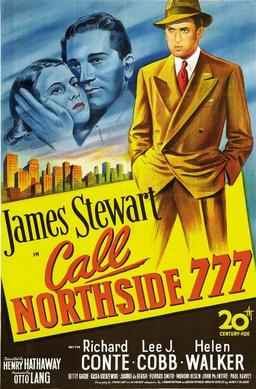
Call Northside 777 is a 1948 reality-based newspaper American drama film directed by Henry Hathaway. The film parallels the true story of a Chicago reporter who proved that a man jailed for murder was wrongly convicted 11 years before. James Stewart stars as the persistent journalist and Richard Conte plays the imprisoned Frank Wiecek. Wiecek is based on Joseph Majczek, who was wrongly convicted of the murder of a Chicago policeman in 1932, one of the worst years of organized crime during Prohibition.

Gaucho literature, also known as gauchesco ("gauchoesque") genre was a literary movement purporting to use the language of the gauchos, comparable to the American cowboy, and reflecting their mentality. Although earlier works have been identified as gauchoesque, the movement particularly thrived from the 1870s to 1920s in Argentina, Uruguay and southern Brazil after which the movement petered out, although some works continued to be written. Gauchoesque works continue to be read and studied as a significant part of Argentine literary history.

The United States competed at the 1952 Summer Olympics in Helsinki, Finland. 286 competitors – 245 men and 41 women – took part in 133 events in 18 sports. They won 76 medals, including 6 podium sweeps; the highest number of medal sweeps in a single Olympiad by one country since World War II and still a record.

Big Jack is a 1949 American Western film starring Wallace Beery, Richard Conte and Marjorie Main. The movie was directed by Richard Thorpe, and the screenplay was written by Gene Fowler and Otto Eis from the novel by Robert Thoeren. The picture is a comedy-drama, set on the American frontier in the early 1800s, about outlaws who befriend a young doctor in legal trouble for acquiring corpses for anatomical research.
"The Mexican" is a 1911 short story by American author Jack London.
This page is based on this
Wikipedia article Text is available under the
CC BY-SA 4.0 license; additional terms may apply.
Images, videos and audio are available under their respective licenses.
